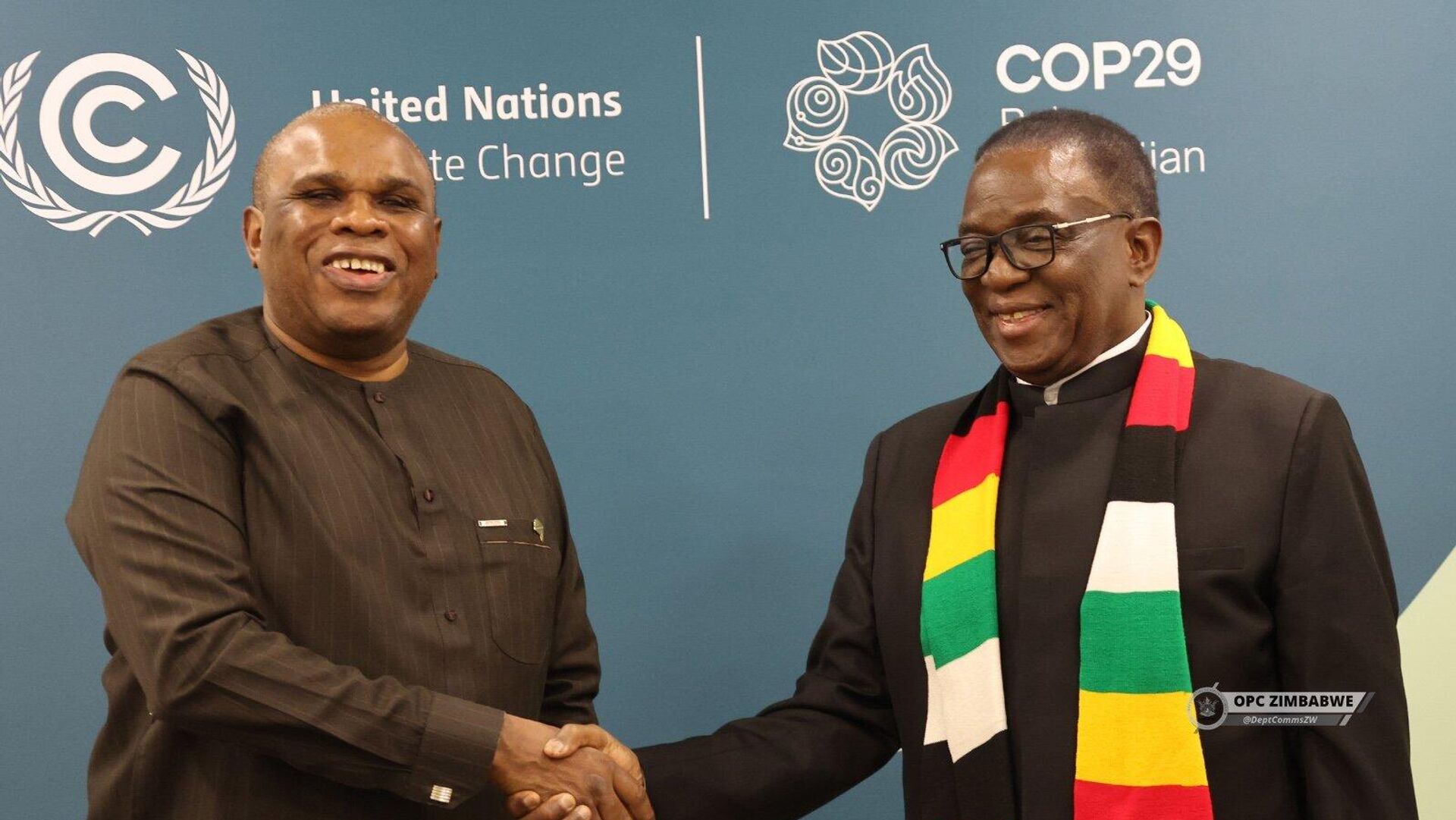https://en.sputniknews.africa/20241114/african-export-import-bank-to-invest-1-billion-into-zimbabwean-economy-1069223130.html
African Export-Import Bank to Invest $1 Billion Into Zimbabwean Economy
African Export-Import Bank to Invest $1 Billion Into Zimbabwean Economy
Sputnik Africa
Afreximbank is a pan-African multilateral financial institution created in 1993 that aims to "stimulate a consistent expansion, diversification and development... 14.11.2024, Sputnik Africa
2024-11-14T12:11+0100
2024-11-14T12:11+0100
2024-11-14T13:04+0100
sub-saharan africa
southern africa
zimbabwe
afreximbank
investment
economy
emmerson mnangagwa
https://cdn1.img.sputniknews.africa/img/07e8/0b/0e/1069222721_0:0:1601:901_1920x0_80_0_0_878a20fed2183e258c6b7defa8f84397.jpg
The African Export-Import Bank will invest $1 billion into the Zimbabwean economy, the president of the bank, Benedict Oramah, said during a meeting with Zimbabwean President Emmerson Mnangagwa on the sidelines of the 29th session of the Conference of the Parties to the UN Framework Convention on Climate Change (COP29) in Azerbaijan.Previously, Afreximbank injected over $2 billion into the African country's economy, Oramah noted. The bank’s president added that Afreximbank is working on developing an industrial park in Zimbabwe. He noted that the similar projects were launched in Kenya, Nigeria and Egypt. Oramah noted that the organization is going to open an African Trade Center in Zimbabwean capital Harare in 2025.In July, Afreximbank spoke of supporting the global course towards de-dollarization and transition to national currencies with the help of the pan-African payment system, which, as was said earlier in June, another 15-20 African countries were ready to join.
https://en.sputniknews.africa/20230623/afreximbanks-payment-system-joined-by-nine-african-countries-as-de-dollarization-gathers-momentum-1060093155.html
southern africa
zimbabwe
Sputnik Africa
feedback@sputniknews.com
+74956456601
MIA „Rossiya Segodnya“
2024
News
en_EN
Sputnik Africa
feedback@sputniknews.com
+74956456601
MIA „Rossiya Segodnya“
Sputnik Africa
feedback@sputniknews.com
+74956456601
MIA „Rossiya Segodnya“
southern africa, zimbabwe, afreximbank, investment, economy, emmerson mnangagwa
southern africa, zimbabwe, afreximbank, investment, economy, emmerson mnangagwa
African Export-Import Bank to Invest $1 Billion Into Zimbabwean Economy
12:11 14.11.2024 (Updated: 13:04 14.11.2024) Afreximbank is a pan-African multilateral financial institution created in 1993 that aims to "stimulate a consistent expansion, diversification and development of African trade, while operating as a first-class, socially responsible financial institution and a center of excellence in African trade matters," according to the organization.
The African Export-Import Bank will invest $1 billion into the Zimbabwean economy, the president of the bank, Benedict Oramah, said during a meeting with Zimbabwean President Emmerson Mnangagwa on the sidelines of the 29th session of the Conference of the Parties to the UN Framework Convention on Climate Change (COP29) in Azerbaijan.
Previously, Afreximbank injected over $2 billion into the African country's economy, Oramah noted.
"Currently, we have about $2 billion worth of funds in Zimbabwe overall. These are to banks, to companies, to government agencies. So, we have an additional $1 billion, also to banks, and also to companies, including support in railway development, the power sector and organizations that are involved in trading activities," Oramah said, as quoted by a local newspaper.
The bank’s president added that
Afreximbank is working on developing an industrial park in Zimbabwe. He noted that the similar projects were launched in Kenya, Nigeria and Egypt. Oramah noted that the organization is going to open an African Trade Center in Zimbabwean capital Harare in 2025.
In July, Afreximbank spoke of supporting the global course towards
de-dollarization and transition to national currencies with the help of the
pan-African payment system, which, as was said earlier in June, another 15-20 African countries were ready to join.


